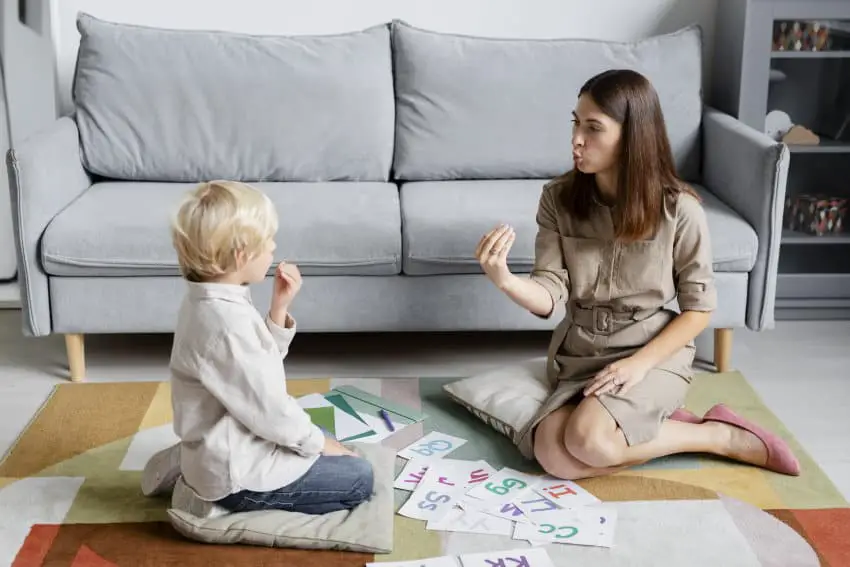How To Protect A Child From Narcissistic Grandparents (11 Tactics Explained)
*We may earn a commission for purchases made using our links. Please see our disclosure to learn more.
If you are the child of a narcissist, you know how abusive they can be. Narcissists don’t spare their own children from the manipulative tactics they use to control everyone in their life. They need a stable source of narcissistic supply, and grandchildren can be a rich source of that. When you’ve experienced that kind of abuse, the last thing you want is for your children to go through the same damaging manipulation you suffered as a child. How can you protect them from their narcissistic grandparents?
Begin by keeping the prospect of going no contact on the table, but if you don’t do that, there are other things you can do. Set clear, firm boundaries with those toxic grandparents. It’s also important to talk to your child, limit contact with the toxicity, and supervise the interactions.
Once I realized that my mother was a narcissist and began to understand the depth of her abuse, I vowed never to let my own children near her. As I healed and understood more about her condition, however, I began to think about how I could allow her contact with my children while still keeping them protected from her toxicity. The techniques I will describe here have worked like a charm. My mother fully understands the limits I’ve put in place, and I regularly check in with my kids to ensure she isn’t doing something behind my back. These tactics can work for you too.
1. Set Clear Boundaries
The first and most important thing you have to do is set clear, firm boundaries with the toxic grandparents in question. The video below explains how to do that. Narcissists won’t respect them, so it will be necessary to be firm when you explain them.
You can begin by determining what you think are important limits that you want them to respect. The most important boundaries I wanted to set were all about lying, triangulation, and gaslighting.
I didn’t want my children to be exposed to those particularly toxic manipulation tactics. I wrote out not only ‘the rules’ about engaging in those behaviors, but I also gave examples and insisted on monitoring their conversations.
But it’s not enough to set the boundary with the narcissist, it’s also important to teach your children how to respond when someone engages in those types of behaviors. I sat down with them and talked to them about the reasons why some people lie and that it’s okay to be skeptical when something doesn’t sound right.
I told them they can come to me with any questions they have about something their grandmother has told them. I vowed to always be honest with them, and I told them I would do my best to explain anything they didn’t understand to them.
My goal was to create a bond of trust with them so they would feel comfortable coming to me. I also told them they have an absolute right to their feelings and interpretations of reality. If someone questions that, I gave them permission to politely agree to disagree.
Lastly, I explained to them that the most important relationships they have are those they have with their siblings. I encouraged them to engage in open communication and explained why someone might try to divide them.
2. Strictly Enforce Those Boundaries

Setting boundaries with a narcissistic grandparent is just the first step in the process. It’s absolutely critical that once you’ve set those boundaries, you enforce them every single time there’s a violation.
Narcissists will agree to the boundaries you’ve set, but they will test them. If you don’t enforce them, it’s like you don’t have any boundaries at all. You have to strictly enforce the consequences for violations.
I know that’s repetitive, but I can’t say it enough. Narcissists are experts at charming you when you finally do set boundaries with them. They seem to believe that when things are going well between the two of you, you’ll forget about enforcing those silly boundaries.
You can’t let that happen, or you’ll be right back to where you started. Setting and enforcing boundaries isn’t about controlling the narcissist’s behavior; it’s all about respecting yourself. You’re making a statement that you value yourself and will take care of yourself.
To do that, it’s critical to make sure the narcissist understands the consequences of boundary violations. One clear way to do this is to write out each boundary you want to set, and along with each one, write down the consequences for any boundary violations.
Give your child’s narcissistic grandparents a copy of the boundaries you’ve set and the consequences for crossing those lines. That way, they can’t claim they didn’t know or understand.
Every time there is a violation, do exactly what you said you would do. While narcissists will push the limit, once they know you’re firm about enforcing your boundaries, they will back off. It doesn’t mean they will never try again, but when they know you mean what you say, they will be more cautious.
3. Limit Contact

Protecting children from narcissistic abuse is vital for their health. As pointed out in this article by the CPTSD Foundation (Complex Post-Traumatic Stress Disorder Foundation), narcissistic abuse actually causes brain damage in children.
A good way to protect your children from toxic grandparents and the damage they can do is to limit their contact with them. This can take several forms. You might limit the length of time they spend with your children, and you can also limit the frequency of visits.
I chose to limit the frequency to once a month and then only for two hours at a time. That way, I could control the visit and prepare for it too. It was important to me to sit down with my children before they were going to be around their grandparents.
I could talk to them about toxic behaviors and explain what they might see from their grandmother. I would also explain that if they feel bad about anything their grandparents say to them, they can always ask me about it.
I take that opportunity to also reassure them that they are loved unconditionally and that they don’t have to be afraid of challenging anything their grandmother might say or do. Of course, your children have to be old enough to understand what you’re talking about. Before that time, it will be up to you to shut down bad behavior.
As well as limiting the contact, you can also limit what conversation topics are appropriate. Let the narcissistic grandparents know what is acceptable and what is not. This way, you can avoid the inappropriate topics that many narcissists will bring up just to get a reaction out of you.
4. Supervise Visits
Until you are confident that your children can spot toxic behavior, shut it down, or are confident that they will tell you about it, it’s a good idea to supervise their visits with their narcissistic grandparents.
Supervising the visits sends a clear message to those narcissistic grandparents that you are serious about protecting your child. You’re willing to make sure they won’t be able to emotionally abuse them as they did you.
It also allows you to watch out for any subtle manipulation tactics that your children might not be sophisticated enough to spot. Narcissistic abuse can often be very subtle, and many young children won’t fully understand what is happening.
You don’t necessarily have to take part in the interactions unless you spot something like that, but you’ll want to be listening to what your children’s narcissistic grandparents are saying. As you already know, narcissists play the long game.
They might lay the foundation for future abuse. You’ve been through it, so you can spot that and shut it down before they get a chance to do any real damage. This is particularly vital if you have more than one child.
Narcissists love to use triangulation to create drama and drive a wedge between family members. They will tell one child one thing and the other something entirely different. By supervising the visits, you can prevent that from happening.
5. Talk to Your Child

This one’s a hard one because no parent wants to have to tell their child about all the ways that the people who are supposed to love them might abuse them. But it’s not only important for preventing narcissistic grandparents from hurting them, it’s critical for preventing them from being abused in other situations as well.
Talking to your child about their narcissistic grandparents helps them understand that these kinds of people exist in the world. While you hate undermining their natural trust, it’s important to prepare them for what they might encounter, not just in their own family but in the world at large.
Unfortunately, there are abusive people out there, and while you don’t want to frighten your child unduly, you do want to prepare them for encountering toxic people. Begin by reassuring your child that they are unconditionally loved and that no matter what, they have inherent value.
Let them know that many people in the world have a kind of mental illness that makes them very insecure, and as a result, they often take that insecurity out on other people. Talk to them about the different ways that abusive behavior can be expressed.
Then talk to them about honoring their own feelings and respecting themselves. Let them know that if something feels wrong, it probably is, and they should listen to their intuition. Remind them that their interpretations, thoughts, opinions, and emotions are valid.
Encourage them to insist on respect for what they might be experiencing and how they might be feeling. Let them know that while other people might disagree with them, their ideas and emotions are just as valid as anyone else’s.
Finally, let them know they can always come to you if they have any questions or feel something abusive is happening.
6. Encourage Open Family Communication

As part of what I expressed about talking with your child, you want to be sure to encourage open family communication. Psychotherapists often talk about creating a safe space for their clients to express their emotions and thoughts.
You want to do the same thing for your children. You want them to know that you won’t judge them for what they might say or feel. You should also let them know that you won’t allow other people in the family to disparage or bully them.
Disagreement on topics is, of course, acceptable, but it should be respectful. When you make your children feel as though they can come to you with anything, you can be certain they will express feelings they might have about possible narcissistic abuse.
You can’t be with them all the time, and even if you supervise visits with their grandparents, they may still be able to contact them without your knowledge. You have to help your children to understand the difference between acceptable behavior and abuse.
It’s kind of like that parable about giving a man a fish versus teaching him how to fish. If you teach your children about how to recognize and defuse abusive situations, you are giving them skills that will help them throughout their life.
By modeling respectful, open forms of communication, you are showing them how they should expect to be treated even when you’re not around.
7. Don’t Let Them Play Favorites
Narcissistic grandparents will absolutely pick a ‘golden grandchild.’ They do this as parents too, and it’s very hurtful. Narcissists always want a golden child and a scapegoat. This might make you wonder if they even love their grandchildren at all. The answer to that is discussed in the following video.
They shower the golden child with love so that the other children will try their hardest to be better and get that kind of attention too. They will do the same with their grandchildren.
While it might seem like it’s okay for the one they choose as a favorite, it’s even more abusive than for the scapegoat child. Yes, the narcissist blames the scapegoat for anything that goes wrong, but they set the golden child up for an ultimate betrayal.
They idealize the golden child or grandchild, but that won’t last. They build up unrealistic expectations for that child, and then they coldly reject that golden grandchild or child when they can’t live up to those expectations.
It’s even more hurtful than rejecting them outright from the beginning. At least the scapegoat develops a tough skin and coping mechanisms to deal with their trauma. The golden child or grandchild never sees it coming.
If you see your narcissistic parents picking a golden grandchild, take them aside and let them know that if they don’t treat the children equally, they won’t be able to see them at all.
8. Confront Hurtful Gossip
Narcissistic grandparents love nothing better than to spread hurtful family gossip. Narcissists love creating drama because it makes them feel powerful. They feel as though they can better manipulate all parties involved.
When your children’s narcissistic grandparents start spreading family gossip, shut it down immediately. Explain to your children that no one knows what other people are going through, and it’s best not to make judgments without a full understanding of the situation.
Let them know that they can possibly have a full understanding of the situation without speaking to the people involved. Listening to rumors isn’t a good way to get reliable information about any topic.
Encourage your children to shut down gossip as well so that even if you’re not around, they won’t listen to that kind of toxic talk. It’s also helpful to explain to them that someone who gossips about other people will also be gossiping about them behind their back.
That will help them to refuse to listen to the kind of rumors that narcissists like to spread. They’ll think twice about simply believing their grandparents when they start gossiping. Remember, you want to give your children the skills they will need to navigate a world increasingly populated by narcissists.
9. Regulate Gift-Giving

One thing that narcissistic grandparents love to do is undermine your parental authority by buying things for your kids that you told them they couldn’t have. You might have done that because the item was too expensive or because you think it was inappropriate for them.
The narcissistic grandparent, however, is basically love-bombing your children when they do this kind of thing. They’re giving your kids something you wouldn’t allow, and once it’s given, it’s more difficult for you to take the gift away.
They will use this tactic to try to get the child ‘on their side.’ They will also use it to create divisions between one child and another. They will give their ‘golden grandchild’ an expensive present while giving little to the other grandchildren.
This creates resentment within your family and between you and your children. To prevent it from happening, you need to regulate their gift-giving. You can do this by insisting that they run their gift by you prior to giving it to your child so you can approve it.
It might even be a good idea to insist that they deliver all gifts to you for wrapping. Let them know you will put the appropriate tag on it, so your children will know it came from their grandparents. By doing this, you can be certain they are giving something you have approved.
Once they get the gift into the hands of your child, it will be hurtful for you to take it away. That’s why it’s better to take the appropriate steps to ensure that you know exactly what they’re giving and that it’s something you approve of for your child.
10. Give Your Child Unconditional Love

Probably the most important thing you can do for your child is to give them unconditional love. That doesn’t mean you condone bad behavior, but it does mean that you’re always in their corner.
Let them know that no matter what kinds of emotions they might express, you’ll never stop loving them. You can also let them know that you’ll always love them regardless of their behavior. You might punish them for doing something wrong, but you won’t stop loving them.
It’s important to give this kind of relationship foundation so that they will be aware of what love feels like. That will help them recognize abuse when they experience it.
It also helps them come to you with any doubts or problems they may be having. If their narcissistic grandparents do or say something that makes them feel odd, they will be willing to come to you and discuss it.
That keeps the lines of communication open so your children can express themselves when they are concerned about something. Children often know that something feels ‘wrong,’ but they can’t quite identify why they feel that way.
That’s when they need a parent who they know loves them unconditionally, someone they know will always be on their side and who always has their best interests at heart. You want to be that parent. This will truly be the best gift you can ever give your child.
11. Keep No Contact on the Table

Finally, it’s important that narcissistic grandparents know you are willing to go no contact if they don’t abide by your wishes. Whether it’s right or not, grandparents really have very few legal rights to see their grandchildren.
You can stop them if you feel they are hurting your child, and they really won’t have much recourse. By impressing upon your narcissistic parents that you will stop them from seeing your children, you are setting a hard boundary about what kind of behavior you will accept.
Don’t be afraid to follow through on that, either. Let them know that so that they will be motivated to adhere to your wishes if they want to see their grandchildren.
Final Thoughts
It might be hard to understand that a narcissistic grandparent would treat even their beloved grandchildren in an abusive manner, but it’s true. Narcissistic grandparents will use every type of abusive tactic they used with you as a child on your own children. Narcissists lack empathy, and therefore, they don’t fully grasp the consequences of their actions on other people. They will lie, triangulate, gaslight, and even use your children’s own emotional wounds against them.
That’s a big part of why I’ve created this 5-Step Roadmap to Heal Emotional Triggers. It’s a good way for both you and your children to recognize, defuse, and heal emotional triggers. Emotional wounds happen to everyone, no matter how good their parents are. It’s just part of life, but the triggers created by that wounding can be healed, and that will prevent toxic people like narcissistic grandparents from using them against their victims. To get a free copy of this handy guide, just click here. I’ll send it directly to your inbox.
--
If you want more tips for dealing with narcissists, setting boundaries, and managing emotional triggers, make sure you subscribe to my youtube channel




